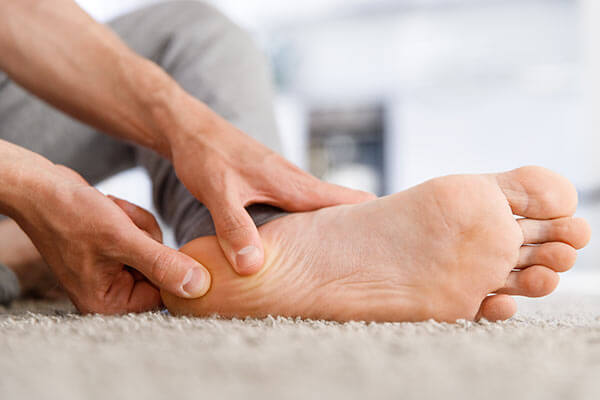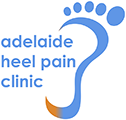Plantar Fasciitis Treatment Hazelwood Park
Struggling with heel pain that’s affecting your ability to work, exercise, or go about your day? Plantar fasciitis could be the underlying cause.


What is Plantar Fasciitis?
The plantar fascia is a crucial band of tissue running along the sole of your foot, connecting the heel to the toes and forming the arch. When inflamed, a condition known as plantar fasciitis can develop, often resulting in intense heel pain.
The Adelaide Heel Pain Clinics near Hazelwood Park regularly treat heel pain, with plantar fasciitis accounting for about 50 cases per day. Although common, it’s a condition that requires immediate attention. Research highlights that 50% of sufferers continue to feel pain after five years, and 45% still experience symptoms after ten. Early consultation with a podiatrist is essential to avoid long-term suffering.
Symptoms of Plantar Fasciitis
The most common symptom of plantar fasciitis is heel pain, typically described as a sharp sensation on the bottom of the foot near the heel. Many patients report the pain being most intense in the morning, particularly when taking their first steps after resting overnight. Pain can also worsen after prolonged periods of sitting or standing. Other symptoms may include pain in the sole of the foot, limping, swelling, and tenderness.


What Causes Plantar Fasciitis
Excessive pressure on the plantar fascia can result in irritation and inflammation, causing heel pain associated with plantar fasciitis. Strenuous activities that involve repetitive impact, such as running, dancing, or gymnastics, often contribute to the problem. Other factors that raise the risk include weight gain, ageing, pregnancy, long periods of standing, and foot structures like flat feet or high arches.

Ultimate 7 Step Checklist to Heal Your Morning Heel Pain
Tired of Limping?
Book an Appointment to Treat Your Heel Pain Today!
Treatment of Plantar Fasciitis
Adelaide Heel Pain Clinics handle dozens of plantar fasciitis cases daily, offering expert care for heel pain of all levels. Our comprehensive treatment options allow us to create personalised care plans suited to your specific needs, helping you find relief and get back to your daily routine.
Adelaide Heel Pain Clinic delivers trusted plantar fasciitis treatment to residents across North Adelaide, Eastwood, Parkside, Glenside, Frewville, Fullarton, Highgate, Myrtle Bank, Brompton, Prospect, Walkerville, Unley, St Peters, Norwood, Thebarton, Mile End, Glenunga and surrounding suburbs.

Radial Shockwave Therapy
Radial shockwave therapy offers a powerful solution for heel pain, requiring no recovery time and posing no long-term side effects. We provide this treatment regularly for patients experiencing various types of heel pain.

Focal Shockwave Therapy
Focal shockwave therapy machines are rare in Australia, and our clinic proudly houses the only one in South Australia. This state-of-the-art treatment provides one of the most effective methods for relieving heel pain.

Dry Needling
Dry needling is a highly regarded technique for releasing tight muscles. By using small acupuncture needles, we can target trigger points effectively to help alleviate muscle pain.

Orthotics
Custom orthotics offer tailored comfort and support, fitting seamlessly into any shoe you choose to wear. They provide a treatment solution built around your foot’s specific requirements.

Low-Level Cold Laser
Low-level cold lasers offer a less painful alternative to traditional hot lasers. As a breakthrough technology in podiatry, this treatment could be the ideal solution for your needs.

Exercise Rehabilitation
Why settle for a one-size-fits-all approach? A podiatrist can create a personalised exercise rehabilitation plan tailored to your pain, health, and goals, offering remarkable benefits for your recovery.
Everything You Need to Know About Plantar Fasciitis
Plantar fasciitis vs. heel spurs: Are they the same?
The answer is no. While both conditions can cause heel pain, plantar fasciitis results from ligament inflammation, whereas heel spurs involve bone-related issues.
Best footwear choices for managing plantar fasciitis
The best shoes for plantar fasciitis depend on your daily activities and specific foot requirements. There’s no universal solution, so it’s important to work with a podiatrist to find the right support for your needs.
Can I continue walking or running if I have plantar fasciitis?
Taking time off from high-impact exercises like running is crucial for proper plantar fascia recovery. Nevertheless, maintaining physical activity is important—try low-impact exercises such as swimming to avoid worsening your heel pain.
Does genetics play a role in plantar fasciitis?
No, plantar fasciitis isn’t hereditary. There’s no evidence of a genetic connection, meaning it isn’t passed down from your parents.
What does plantar fasciitis feel like?
Most people with plantar fasciitis report a sharp, stabbing pain around the heel area at the bottom of the foot. The pain tends to be at its worst when taking the first steps after waking up or after sitting or standing for long durations.
When is it time to see a podiatrist for plantar fasciitis?
It’s important not to ignore heel pain. If you’re experiencing any symptoms, seeing a podiatrist as soon as possible is the best course of action.
Are compression socks effective for plantar fasciitis?
Yes, ompression socks are helpful in managing plantar fasciitis by supporting the arches and ankles, which can improve alignment and limit unnecessary movement. For tailored recommendations, speak with a podiatrist about your specific condition.
Why is plantar fasciitis pain worse in the morning?
When you’re inactive for extended periods, your plantar fascia shortens. This causes pain when you first start moving again, making the initial steps in the morning or after sitting particularly uncomfortable.

Book Online in less than 60 Seconds
Join over 20,000 South Australians who are now pain free!
